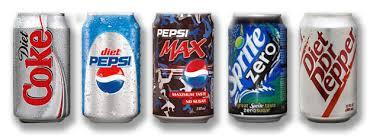Tinnitus , ringing in the ear caused by diet drinks.
posted: Oct. 27, 2020.
Have a Diet Coke and...TINNITUS?

That’s right, researchers suspect aspartame, the most common sweetener in diet soda, might have a connection to tinnitus. Though a definitive link between the two has yet to be proven, there are two ways aspartame can increase tinnitus:
- It is believed aspartame contains components that might be toxic to the brain and the inner ear. Those neurotoxins are phenylalanine, aspartic acid and methanol and become toxic after periods of long storage or exposure to heat.
- Aspartame is also known to increase electrical activity in the brain. Researchers now believe patients with tinnitus already have an elevated level of electrical activity in the brain, and more electrical activity is the last thing they need. In fact, reducing electrical activity in the brain has been proven to improve tinnitus.
Initially aspartame was found to be safe, but the FDA recently released results of a survey which appeared in the Journal of Applied Nutrition. Over 500 persons who reported toxicity effects from aspartame ingestion were surveyed. Among the adverse effects found, 13 percent reported having tinnitus, along with 9 percent that reported a “severe intolerance for noise” and 5 percent that reported significant hearing loss.
So what should you do? If you have tinnitus, avoiding aspartame or its various counterparts (AminoSweet, NutraSweet, Equal, Natrataste or Spoonful) may be a good place to start. Carefully read the labels of any pre-packaged foods and be aware anything labeled “sugar-free” or “diet” is a potential suspect. If you are looking for a substitute for aspartame to add to your cup of tea, you can try natural sweeteners such as honey, agave or Stevia.
Tinnitus Facts
Tinnitus is the perception of sound when no actual noise is present. It commonly manifests itself as a ringing, buzzing or hissing in the ears. It is important to note that tinnitus is not a disease in and of itself, but a symptom of an underlying health condition. Though it sometimes accompanies hearing loss, tinnitus can also exist on its own when no hearing loss is present. The National Institute of Deafness and Communication Disorders (NIDCD) estimates that approximately 25 million adults in the U.S., or about 10 percent of the adult population, has experienced tinnitus lasting at least 5 minutes in the past year.
For some, tinnitus can just be a mild, occasional annoyance. For others it can be debilitating resulting in sleep problems, anxiety and depression. Those with tinnitus often find themselves increasingly frustrated and socially isolated; work, family life and social life suffer as those with tinnitus desperately seek a solution to the seemingly endless ringing in their ears.
